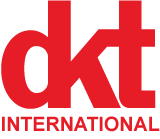DKT International
 |
|
| Founded | 1989 |
|---|---|
| Founder | Phil Harvey |
| Focus | Family planning and HIV/AIDS prevention |
| Location | |
|
Area served
|
Africa, Asia, Latin America |
| Method | Social marketing of family planning and HIV/AIDS products and services |
|
President & CEO
|
Christopher Purdy |
|
Revenue
|
US$148,146,398 |
| Slogan | Changing Lives Through Social Marketing |
| Website | dktinternational.org |
DKT International (DKT) is a charitable non-profit organization that promotes family planning and HIV prevention through social marketing. The Washington, D.C.-based DKT was founded in 1989 by Phil Harvey and operates in Africa, Asia, and Latin America. Its revenue largely comes from sales of low-cost contraceptives. In 2015, DKT sold over 622 million condoms, 78 million cycles of oral contraceptives, 25 million injectable contraceptives and 1.9 million intrauterine devices (IUDs). This is equivalent to 30 million couple years of protection (CYPs), making DKT one of the largest private providers of contraceptives in the developing world. The average cost per CYP was less than US$2.00. DKT's marketing strategies have included advertising, creating location-specific brands, working with local social networks and militaries, and targeting high-risk groups. DKT also works with health workers and clinics that provide family planning products, information, and services.Charity Navigator has given DKT a four-star rating, with 93.8% of its budget going towards programs and 6.1% towards administration and fund raising in 2014.
Phil Harvey became interested in family planning in 1968 while working on emergency food relief for CARE International in India. In 1970, he and his fellow UNC student Tim Black founded the business Adam & Eve in order to finance their charitable activities, and also founded the non-profit health organization Population Services International that same year. DKT International, named for D.K. Tyagi, an early pioneer of family planning in India, was founded in 1989. DKT has grown rapidly over the years; its revenue from selling contraceptives increased from US$4.5 million in 1996 to $103 million in 2014, and its CYPs increased from 5.7 million in 2002 to more than 30 million in 2015.
...
Wikipedia
